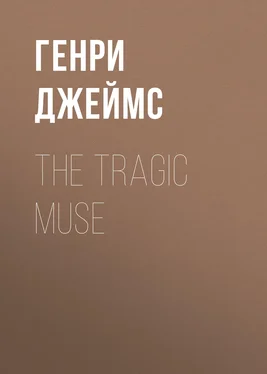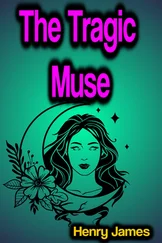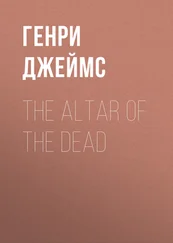Генри Джеймс - The Tragic Muse
Здесь есть возможность читать онлайн «Генри Джеймс - The Tragic Muse» — ознакомительный отрывок электронной книги совершенно бесплатно, а после прочтения отрывка купить полную версию. В некоторых случаях можно слушать аудио, скачать через торрент в формате fb2 и присутствует краткое содержание. Жанр: foreign_antique, foreign_home, cinema_theatre, на английском языке. Описание произведения, (предисловие) а так же отзывы посетителей доступны на портале библиотеки ЛибКат.
- Название:The Tragic Muse
- Автор:
- Жанр:
- Год:неизвестен
- ISBN:нет данных
- Рейтинг книги:5 / 5. Голосов: 1
-
Избранное:Добавить в избранное
- Отзывы:
-
Ваша оценка:
- 100
- 1
- 2
- 3
- 4
- 5
The Tragic Muse: краткое содержание, описание и аннотация
Предлагаем к чтению аннотацию, описание, краткое содержание или предисловие (зависит от того, что написал сам автор книги «The Tragic Muse»). Если вы не нашли необходимую информацию о книге — напишите в комментариях, мы постараемся отыскать её.
The Tragic Muse — читать онлайн ознакомительный отрывок
Ниже представлен текст книги, разбитый по страницам. Система сохранения места последней прочитанной страницы, позволяет с удобством читать онлайн бесплатно книгу «The Tragic Muse», без необходимости каждый раз заново искать на чём Вы остановились. Поставьте закладку, и сможете в любой момент перейти на страницу, на которой закончили чтение.
Интервал:
Закладка:
But I am far from pretending that these desperations of ingenuity have not—as through seeming most of the very essence of the problem—their exasperated charm; so far from it that my particular supreme predicament in the Paris hotel, after an undue primary leakage of time, no doubt, over at the great river-spanning museum of the Champ de Mars and the Trocadero, fairly takes on to me now the tender grace of a day that is dead. Re-reading the last chapters of The Tragic Muse I catch again the very odour of Paris, which comes up in the rich rumble of the Rue de la Paix—with which my room itself, for that matter, seems impregnated—and which hangs for reminiscence about the embarrassed effort to "finish," not ignobly, within my already exceeded limits; an effort prolonged each day to those late afternoon hours during which the tone of the terrible city seemed to deepen about one to an effect strangely composed at once of the auspicious and the fatal. The "plot" of Paris thickened at such hours beyond any other plot in the world, I think; but there one sat meanwhile with another, on one's hands, absolutely requiring precedence. Not the least imperative of one's conditions was thus that one should have really, should have finely and (given one's scale) concisely treated one's subject, in spite of there being so much of the confounded irreducible quantity still to treat. If I spoke just now, however, of the "exasperated" charm of supreme difficulty, that is because the challenge of economic representation so easily becomes, in any of the arts, intensely interesting to meet. To put all that is possible of one's idea into a form and compass that will contain and express it only by delicate adjustments and an exquisite chemistry, so that there will at the end be neither a drop of one's liquor left nor a hair's breadth of the rim of one's glass to spare—every artist will remember how often that sort of necessity has carried with it its particular inspiration. Therein lies the secret of the appeal, to his mind, of the successfully foreshortened thing, where representation is arrived at, as I have already elsewhere had occasion to urge, not by the addition of items (a light that has for its attendant shadow a possible dryness) but by the art of figuring synthetically, a compactness into which the imagination may cut thick, as into the rich density of wedding-cake. The moral of all which indeed, I fear, is, perhaps too trivially, but that the "thick," the false, the dissembling second half of the work before me, associated throughout with the effort to weight my dramatic values as heavily as might be, since they had to be so few, presents that effort as at the very last a quite convulsive, yet in its way highly agreeable, spasm. Of such mild prodigies is the "history" of any specific creative effort composed!
But I have got too much out of the "old" Kensington light of twenty years ago—a lingering oblique ray of which, to-day surely quite extinct, played for a benediction over my canvas. From the moment I made out, at my high-perched west window, my lucky title, that is from the moment Miriam Rooth herself had given it me, so this young woman had given me with it her own position in the book, and so that in turn had given me my precious unity, to which no more than Miriam was either Nick Dormer or Peter Sherringham to be sacrificed. Much of the interest of the matter was immediately, therefore, in working out the detail of that unity and—always entrancing range of questions—the order, the reason, the relation, of presented aspects. With three general aspects, that of Miriam's case, that of Nick's and that of Sherringham's, there was work in plenty cut out; since happy as it might be to say, "My several actions beautifully become one," the point of the affair would be in showing them beautifully become so—without which showing foul failure hovered and pounced. Well, the pleasure of handling an action (or, otherwise expressed, of a "story") is at the worst, for a storyteller, immense, and the interest of such a question as for example keeping Nick Dormer's story his and yet making it also and all effectively in a large part Peter Sherringham's, of keeping Sherringham's his and yet making it in its high degree his kinsman's too, and Miriam Rooth's into the bargain; just as Miriam Rooth's is by the same token quite operatively his and Nick's, and just as that of each of the young men, by an equal logic, is very contributively hers—the interest of such a question, I say, is ever so considerably the interest of the system on which the whole thing is done. I see to-day that it was but half a system to say, "Oh Miriam, a case herself, is the link between the two other cases"; that device was to ask for as much help as it gave and to require a good deal more application than it announced on the surface. The sense of a system saves the painter from the baseness of the arbitrary stroke, the touch without its reason, but as payment for that service the process insists on being kept impeccably the right one.
These are intimate truths indeed, of which the charm mainly comes out but on experiment and in practice; yet I like to have it well before me here that, after all, The Tragic Muse makes it not easy to say which of the situations concerned in it predominates and rules. What has become in that imperfect order, accordingly, of the famous centre of one's subject? It is surely not in Nick's consciousness—since why, if it be, are we treated to such an intolerable dose of Sherringham's? It can't be in Sherringham's—we have for that altogether an excess of Nick's. How, on the other hand, can it be in Miriam's, given that we have no direct exhibition of hers whatever, that we get at it all inferentially and inductively, seeing it only through a more or less bewildered interpretation of it by others. The emphasis is all on an absolutely objective Miriam, and, this affirmed, how—with such an amount of exposed subjectivity all round her—can so dense a medium be a centre? Such questions as those go straight—thanks to which they are, I profess, delightful; going straight they are of the sort that makes answers possible. Miriam is central then to analysis, in spite of being objective; central in virtue of the fact that the whole thing has visibly, from the first, to get itself done in dramatic, or at least in scenic conditions—though scenic conditions which are as near an approach to the dramatic as the novel may permit itself and which have this in common with the latter, that they move in the light of alternation . This imposes a consistency other than that of the novel at its loosest, and, for one's subject, a different view and a different placing of the centre. The charm of the scenic consistency, the consistency of the multiplication of aspects , that of making them amusingly various, had haunted the author of The Tragic Muse from far back, and he was in due course to yield to it all luxuriously, too luxuriously perhaps, in The Awkward Age , as will doubtless with the extension of these remarks be complacently shown.
To put himself at any rate as much as possible under the protection of it had been ever his practice (he had notably done so in The Princess Casamassima , so frankly panoramic and processional); and in what case could this protection have had more price than in the one before us? No character in a play (any play not a mere monologue) has, for the right expression of the thing, a usurping consciousness; the consciousness of others is exhibited exactly in the same way as that of the "hero"; the prodigious consciousness of Hamlet, the most capacious and most crowded, the moral presence the most asserted, in the whole range of fiction, only takes its turn with that of the other agents of the story, no matter how occasional these may be. It is left, in other words, to answer for itself equally with theirs: wherefore (by a parity of reasoning if not of example) Miriam's might without inconsequence be placed on the same footing; and all in spite of the fact that the "moral presence" of each of the men most importantly concerned with her—or with the second of whom she at least is importantly concerned— is independently answered for. The idea of the book being, as I have said, a picture of some of the personal consequences of the art-appetite raised to intensity, swollen to voracity, the heavy emphasis falls where the symbol of some of the complications so begotten might be made (as I judged, heaven forgive me!) most "amusing": amusing I mean in the best very modern sense. I never "go behind" Miriam; only poor Sherringham goes, a great deal, and Nick Dormer goes a little, and the author, while they so waste wonderment, goes behind them : but none the less she is as thoroughly symbolic, as functional, for illustration of the idea, as either of them, while her image had seemed susceptible of a livelier and "prettier" concretion. I had desired for her, I remember, all manageable vividness—so ineluctable had it long appeared to "do the actress," to touch the theatre, to meet that connexion somehow or other, in any free plunge of the speculative fork into the contemporary social salad.
Читать дальшеИнтервал:
Закладка:
Похожие книги на «The Tragic Muse»
Представляем Вашему вниманию похожие книги на «The Tragic Muse» списком для выбора. Мы отобрали схожую по названию и смыслу литературу в надежде предоставить читателям больше вариантов отыскать новые, интересные, ещё непрочитанные произведения.
Обсуждение, отзывы о книге «The Tragic Muse» и просто собственные мнения читателей. Оставьте ваши комментарии, напишите, что Вы думаете о произведении, его смысле или главных героях. Укажите что конкретно понравилось, а что нет, и почему Вы так считаете.












